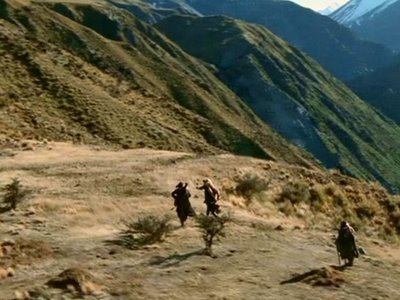It is through the intervention of the Ents of Fangorn that victory is won at Helm’s Deep but this frightens the Riders of Rohan more perhaps than did the enemies they faced in the battle. For a kind of disenchantment has been at work among them for a very long time. You may remember that when Aragorn, Legolas and Gimli first encountered Eomer and his war band upon the plains of Rohan they met with mistrust and some fear. When Eomer heard that the friends had met Galadriel in Lothlorien he reacted with both wonder but also fearful hostility.
“Then there is a Lady in the Golden Wood, as old tales tell!” he said. “Few escape her nets, they say. These are strange days! But if you have her favour, then you also are net-weavers and sorcerers, maybe.”
Théoden’s reaction to his first encounter with Ents is less hostile, perhaps, after all he has just benefitted from their timely intervention, but it is hardly less ignorant! He declares that he knows nothing of them so Gandalf takes the opportunity to teach him a few home truths and he shows Théoden that they are indeed truths he once learned in his own home.
“They are the shepherds of the trees…Is it so long since you listened to tales by the fireside? There are children in your land who, out of the twisted threads of story, could pick the answer to your question. You have seen Ents, Ents out of Fangorn Forest, which in your tongue you call the Entwood. Did you think that the name was given only in idle fancy?”
Théoden’s response shows that he may be ignorant as are his people but that he does ponder things deeply.
“Out of the shadows of legend I begin to understand the marvel of the trees, I think…Songs we have that tell of these things, but we are forgetting them, teaching them only to children, as a careless custom. And now the songs have come down among us out of strange places, and walk visible under the Sun.”
Théoden’s musings tell the tale of our own times too. What we know call Fairy Tales are stories thought to be fit only for children and so the very word, Fairy, is considered childish and the culture in which these tales arose, the culture of our medieval ancestors, is thought to have been immature and in need of enlightenment. Indeed from the time of the Enlightenment onward such tales became, as Théoden put it, taught only to children “as a careless custom”.
Recently it has been noted by many critics that much of the best writing of our time has been written ostensibly for children though sadly one leading author in the UK commented that he was disturbed by the sight of adults on trains reading Harry Potter. In the packed church in which I watched a school nativity play this morning there was an atmosphere of delight as parents and grandparents gazed upon their young dressed as characters from the gospel stories. There is a general acceptance that faith is a good thing for children especially when linked to a moral education but one, sadly perhaps, that must be left behind on leaving childhood. And yet the word adult when used as an adjective to describe books, films, pictures etc. is used to denote a deeply immature sexuality that has perhaps a place in an occasional time of carnival as ancient societies knew but is deeply destructive of mature sexual relationships and mature societies when it becomes the norm.
Thankfully Tolkien himself created a mythology that speaks to both adults and children in our own time. His work has transformed the lives of many and sowed seeds of enchantment among many more that will bear fruit. I pray that we too may find songs coming down to us “out of strange places” that may “walk visible under the Sun.”







